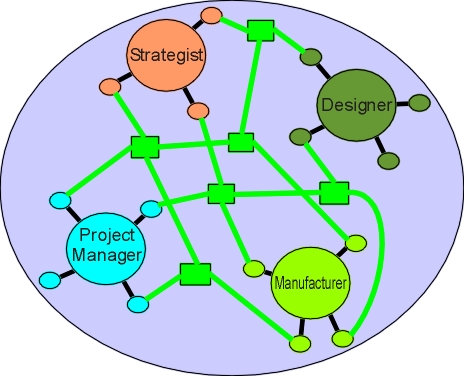
Knowledge Management was introduced with great fanfare, even becoming fashionable, but it fizzled - people were too protective of their own little bit of knowledge, they didn't want to share it, they didn't want it scrutinised, and they certainly didn't want to change it, so innovation was stoutly resisted. Perhaps a new buzzword needs to be introducted - SM.
Synthesis - the bringing together of different areas of knowledge - requires the exposure of at least some knowledge of each of the participants. It also requires the fitting together of those areas of knowledge - a process at which none of the participants is especially skilled. It may represent an easier entry into improving the operation of the organisation than KM has offered.
Where does synthesis occur? An obvious place is in a project. We already have the vocabulary. Requirements Elicitation and the Stakeholders. Currently, there is an implied synthesis required of the Project Manager. The PM is expected to liaise with stakeholders and assemble all their requirements into a coherent whole, which then becomes the goal of the project.
Firstly, the requirements from the different stakeholders are most unlikely to form a coherent whole - see Requirements Elicitation.
Secondly, why should we imagine that the PM is any better at synthesis than any other person involved in the project. We should expect their ability would be less, constrained as it is with a mantra of "on time and under budget" - we can rely on the PM to cut away anything that would delay delivery or increase the cost, whether or not it is vital. How could the PM be expected to know that - the requirement may just look like any other, may have been laid down before the PM joined the project, the person who laid it down is no longer involved, the PM hasn't the time to understand every nuance.
In many cases, the PM does little more than whip the horses and hope they know their own way home. If they do, the method works to reach home a little quicker - if they don't, the project ends up a dirty mess. The PM may be capable of sweet talking a grumpy individual, or filling a staffing gap, but a complex synthesis is not what they do - they would be fired as a time waster if they did it on a simple project, so have no experience on a complex project.
Sometimes, it seems that the responsibility for synthesis has been moved to the Program Manager. When there are many projects and limited resources, there is the need for a synthesis, but at a different level - "How do I do all these things with what I have", not "How do I do any one thing well".
We probably should look more closely at the points in the organisation where synthesis is required, and spend more effort there.

Weaving a synthesis with undirected logical thread